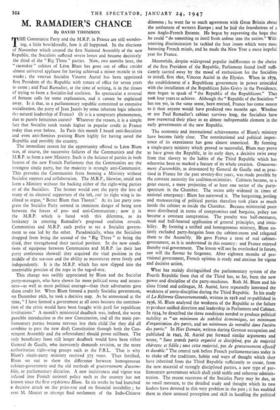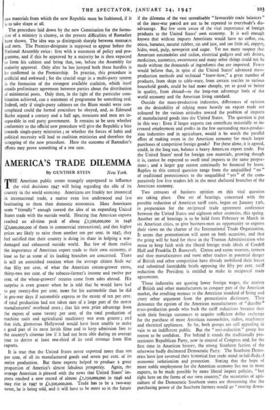M. RAMADIEWS CHANCE
By DAVID THOMSON
THE Communist Party and the M.R.P. in France are still wonder- ing, a little bewilderedly, how it all happened. In the elections of November which created the first National Assembly of the new Republic, the Socialists suffered severe losses and became decisively the third of the " Big Three " parties. Now, two months later, the " caretaker " cabinet of Leon Blum has gone out of office amidst almost universal applause for having achieved a minor miracle in six weeks ; the veteran Socialist Vincent Auriol has been appointed first President of the Republic with tenure of office for seven years to come ; and Paul Ramadier, at the time of writing, is in the throes of trying to form a Socialist-led coalition. So spectacular a reversal of fortune calls for some explanation, and it cannot be explained away. Is it that, in a parliamentary republic committed to extensive socialisation, the party of Jean Jaures by some inherent logic inherits the natural leadership of France? Or is it a temporary phenomenon, due to purely fortuitous causes? Whatever the reason, it is a simple fact that Socialist stock stands higher in popular credit in France today than ever before. In Paris this month I heard anti-Socialists and even anti-Semites praising Blum highly for having saved the Republic and possibly the country.
The immediate reason for the opportunity offered to Leon Blum was, of course, the successive failures of the Communists and the M.R.P. to form a new Ministry. Such is the balance of parties in both houses of the new French Parliament that the Communists are the strongest single party, but the majority is strongly anti-Communist. This prevents the Communists from forming a Ministry without Socialist support and collaboration. The M.R.P., likewise, could not form a Ministry without the backing either of the right-wing parties or of the Socialists. The former would cost the party the loss of many of its electoral supporters of the left, one its right wing is in- clined to argue, " Better Blum than Thorez:' At its last party con- gress the Socialist Party seemed in imminent danger of being torn between the forces of pro- and anti-Communism ; now it is the M.R.P. which is faced with this dilemma, as its hesitancy in entering Ramadier's proposed coalition reveals. Communists and M.R.P. each prefer to see a Socialist govern- ment to one led by the other. Paradoxically, when the Socialists dropped from being the second of the " Big Three " to being the third, they strengthened their tactical position. In the new condi- tions of 'equipoise between Communists and M.R.P. (as their last party conference showed) they acquired the vital position in the middle of the see-saw and the ability to manoeuvre more freely and independently. It is the M.R.P. which has now slipped into the unenviable position of the rope in the tug-of-war.
This change was swiftly appreciated by Blum and the Socialist party-managers, who have shown far more political sense and astute- ness—as well as more political courage—than their adversaries gave them credit for. When Blum formed a purely Socialist government, on December 16th, he took a decisive step. As he announced at the time, " I have formed a government at all costs because the continua- tion of the crisis would have been fraught with peril for republican institutions." A month's ministerial deadlock was, indeed, the worst possible introduction to the new Constitution, and all the main par- liamentary parties became nervous lest their child (for they did all combine to pass the new draft Constitution through both the Con- stituent Assembly and the referendum) should prove stillborn. The only beneficiary from still longer deadlock would have been either General de Gaulle, who incessantly demands revision, or the more authoritarian right-wing groups such as the P.R.L. That is why Blum's single-party ministry received 575 votes. Thus fortified, Blum set out to show the difference between homogeneous cabinet-government and the old methods of gouvernement d'assem- blie, or parliamentary dictation. A new incisiveness and vigour was infused into French national policy such as the country has not known since the first experience Blum. In six weeks he had launched a decisive attack on the price-rise and on financial instability ; he sent M. Moutet to attempt final settlement of the Indo-Chinese dilemma ; he went far to reach agreement with Great Britain about the settlement of western Europe ; and he laid the foundations of a new Anglo-French Entente. He began by expressing-the hope that he could " do something to instil fresh ardour into the nation." With unerring discrimination he tackled the four issues which were most harassing French minds, and he made the New Year a more hopeful year for France.
Meanwhile, despite widespread popular indifference to the choice of the first President of the Republic, Parliament found itself suffi- ciently carried away by the mood of enthusiasm for the Socialists to install, first shin, Vincent Auriol in the Elysees. When in 1879, the establishment of a Republican government in power coincided with the installation of the Republican Jules Grevy in the Presidency, men began to speak of " the Republic of the Republicans." That took four years to achieve.- Although the " Republic of the Socialists " has not yet, in the same sense, been erected, France has 'come nearer to it than anyone would have predicted two months ago. Whether or not Paul Ramadier's cabinet survives long, the Socialists have now reasserted their place as an almost indispensable element in the early governments of the new Republic.
The economic and international achievements of Blum's ministry have become fairly clear. The constitutional and political impor- tance of its experiment has gone almost unnoticed. By forming a single-party ministry which proved so successful, Blum may prove to have given the Republic, in its early days, a decisive twist away from that slavery to the habits of the Third Republic which has otherwise been so marked a feature of its whole creation. Gouverne- ment d'assemblie, as denounced by General de Gaulle and as prac- tised in France for the past seventy-five years, was made possible by the constant necessity for coalition-ministries. Cabinets became, to a great extent, a mere projection of at least one sector of the party- spectrum in the Chamber. The sector only widened in times of national emergency : Blum has narrowed it. The bargaining, jostling and manoeuvring of political parties therefore took place as much inside the cabinet as inside the Chamber. Because ministerial posts were distributed in terms of compromises and bargains, policy too became a constant compromise. The penalty was half-measures, weak and half-hearted application of general principles, and insta- bility. By forming a unified and homogeneous ministry, Blum en- tirely excluded party-bargains from the cabinet-room and relegated them to the Assembly. He gave France a taste of real cabinet- government, as it is understood in this country : and France enjoyed thereby real government. The lesson will not be overlooked in future, nor will the flavour be forgotten. After eighteen months of pro- visional government, French opinion is ready and anxious for vigour and decisive action.
What has mainly distinguished the parliamentary system of the Fourth Republic from that of the Third has, so far, been the new power and discipline of the party-machines. Both M. Blum and his close friend and colleague, M. Auriol, have repeatedly lamented the weakness of party-discipline during the Third Republic. In his study of La Reforme Gouvernementale, written in 1918 and re-published in 1936, M. Blum analysed the weakness of the Republic as the failure to produce unified direction and leadership in Parliament and Cabinet. In 1934, he described the three conditions needed to produce political stability as " un minimum de stability economique, un minimum d'organisation des partis, and un minimum de moraine clans ?action des partis." In Hier Demain, written during German occupation and published in 1945, M. Auriol put forward similar arguments and wrote, " Sans zrands partis organise et discipline, pas de majority cherente et fidele ; sans cette majority, pas de gouvernement effectif et durable." The central task before French parliamentarians today is to shake off the traditions, habits and ways of thought which they have inherited from the Third Republic sufficiently to create, from the new material of strongly disciplined parties, a new type of par- liamentary government which shall yield stable and coherent adminis- tration. The recent successes of the Socialist Party may be due, in no small measure, to the detailed study and thought which its two leaders have devoted to this very problem in the past ; it has enabled them to show unusual perception and skill in handling the political raw materials from which the new Republic must be fashioned, if it is to take shape at all.
The procedure laid down by the new Constitution for the forma- tion of a ministry is clumsy, as the present difficulties of Ramadier have shown. The idea was to distinguish sharply between measures and men. The Premier-designate is supposed to appear before the National Assembly twice: first with a statement of policy and pro- gramme, and if this be approved by a majority he is then expected to form his cabinet and bring that, too, before the Assembly for majority approval. Only after he has jumped both these hurdles is he confirmed in the Premiership. In practice, this procedure is artificial and awkward ; for the crucial stage in a multi-party system is the formation of the strongest available coalition, which itself entails preliminary agreement between parties about the distribution of ministerial posts. Only then, in the light of the particular com- bination achieved, can a statement of programme be something real. Indeed, only if single-party cabinets on the Blum model were con- templated could the formal procedure be obeyed, and, as Edmund Burke argued a century and a half ago, measures and men are in- separable in real party government. It remains to be seen whether conformity to the official new procedure will give the Republic a bias towards single-party ministries ; or whether the forces of habit and political necessity will lead to coalition ministries and therefore the scrapping of the new procedure. Here the outcome of Ramadier's efforts may prove something of a test case.



































 Previous page
Previous page